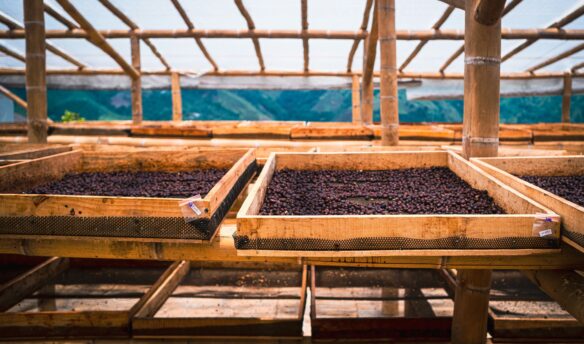Coffee might be old—really old. A new study puts coffee’s birthdate at more than 600,000 years ago. Still, this old geezer is even more popular than ever, with new research indicating that coffee consumption among Americans is at a 20-year high.
‘Your Morning Coffee May be More Than a Half Million Years Old’ – via Associated Press
That coffee you’re drinking right now is probably not that old. If it is, you should freshen your cup. But arabica coffee beans have probably existed for over half a million years.
Slightly clickbaity headline aside, an international team of researchers found that the species was “born” more than 600,000 years ago through natural crossbreeding. “In other words, prior to any intervention from man,” Professor Victor Albert from the University of Buffalo told the AP. For reference, a previous study we told you about in January put arabica’s age at less than 50,000 years old.
The study, published in Nature Genetics, “used genomic information in plants alive today to go back in time and paint the most accurate picture possible of Arabica’s long history, as well as determine how modern cultivated varieties are related to each other” Albert said in a press release. Basically, they built a family tree for the humble coffee plant.
But that wasn’t the end. To piece together this historical puzzle, researchers studied the genomes of Coffee canephora (aka robusta) and Coffea eugenioides, which crossbred to create arabica. They also sequenced the genomes of over 30 different arabica varieties—including a sample from the 18th century used by the Swedish naturalist Carl Linnaeus. Using a computational modeling program, the scientists searched for the earliest evidence of the species’ genesis, which they determined to be around 29,000 generations—or 610,000 years—ago.
Due to its limited genetic diversity—a consequence of small population size and history of inbreeding—arabica is vulnerable to the effects of climate change. The goal of this study, according to the press release, was to create “the highest quality reference genome to date,” which the researchers hope will enable the development of hardier cultivars. “A detailed understanding of the origins and breeding history of contemporary varieties are crucial to developing new Arabica cultivars better adapted to climate change,” Albert said.
‘Fluctuating Coffee Prices are Putting Mental Pressure on Vietnamese Farmers’ – via Phys.org
Like many agricultural products, the commodity price of coffee is extremely volatile. In the past decade, we’ve seen highs—especially at the height of the pandemic-driven supply chain turmoil in 2021-22—and severe lows.
Price volatility takes a toll on the farmers who grow and process coffee, and a new study from the University of Copenhagen sheds light on the psychological effects of this uncertainty. “Our results suggest that not only poverty, but also the risk of poverty caused by fluctuating prices has a significant additional negative effect on the mental well-being of farmers in low-income countries,” said study co-author Professor Finn Tarp.
Researchers used household survey data from Vietnam coupled with the ICO’s monthly robusta price reports to investigate the effects of price fluctuations on producers. The study, published in the American Journal of Agricultural Economics, found “an increase in volatility of the international coffee price to be positively associated with psychological distress among coffee farmers.”
Impacts included “an increase in mental stress due to pessimistic expectations of future economic well-being, increased cognitive load and alcohol consumption, and reduced social capital.”
The authors say the results are likely to be transferable to other coffee-producing countries. They advocate for more government assistance for smallholder farmers and protection from price fluctuations that are beyond their control. “Governments should consider introducing policies that stabilize farmers’ incomes, for example by offering price insurance or increasing access to market-based risk management,” Tarp suggests.
‘Coffee’s Popularity In America Is At A 20-Year High’ – via Sprudge
America loves coffee, and that love is growing stronger by the year. The latest National Coffee Data Trends report from the National Coffee Association finds daily consumption is at a 20-year high.
The number of Americans who consumed coffee in the past day rose from 49% in 2004 to 67% in 2024—a 37% increase in two decades. To hammer this point home: in the latest report, more people reported drinking coffee than water.
If you look at people who reported drinking coffee in the last week, that number goes up: 75% of Americans reported enjoying a cup of coffee weekly, up only 4% since 2023. Considering that 22% of Americans are children, that statistic becomes very impressive.
57% of Americans reported drinking specialty coffee, up 7.5% from the year before. When it comes to how people enjoy making coffee, drip coffee, and single-cup brewers still reign supreme. But interestingly, ready-to-drink coffees have become more popular, overtaking espresso machines for the third-place slot.
“NCA’s exclusive research has tracked coffee trends for more than 70 years, and America’s favorite beverage has only ever continued to grow in terms of overall popularity and in innovating to meet consumers’ evolving tastes,” said NCA President and CEO William “Bill” Murray in a press release.
“This year’s two-decade high is only the latest proof of America’s enduring love affair with coffee.”
More News
‘Meet The New 2024 US Coffee Champions Crowned In Chicago’ – via Sprudge
‘Fellow Launches Its First Automatic Brewer, the Feature-Rich Aiden‘ – via Daily Coffee News
‘Ethiopia Opens Door for Prized Coffee Exports to Foreigners’ – via Bloomberg
‘Specialty Coffee Expo Breaks Attendee and Exhibitor Records’ – via Global Coffee Report
‘Diedrich Launches the All-Electric DR3-E Roaster at SCA Expo‘ – via Daily Coffee News
‘Ethiopian Cup of Excellence Returns’ – via Global Coffee Report
‘Milklab launches Roaster Royale competition with AU$10,000 cash prize‘ – via BeanScene Magazine
‘Coffee Coalition for Racial Equity Gives Inaugural ‘First Sip’ Awards‘ – via Daily Coffee News
‘Meet The Winners of the Elevating Dreams, Erasing Divides Coffee Pitch Event‘ – via Fresh Cup Magazine
The Week in Coffee Unionizing
After years of aggressive pushback against its unionized workers, Starbucks changed tack at the beginning of 2024 and agreed to negotiate contracts with union representatives.
While that’s good news for workers, even if talks go smoothly, there are still additional issues to resolve. Bloomberg Law reports that hundreds of National Labor Relations Board charges are still pending against the coffee giant.
Regional offices have issued around 130 complaints covering roughly 430 unfair labor practices (ULP) charges since 2021. “It would be a very complicated process to unscramble all the eggs, given that the cases are in very different procedural postures,” said former NLRB lawyer Michelle Devitt.
The article lays out the complications: “The many Starbucks ULP cases are at different phases in the NLRB process, which starts with a charge filed at the board, proceeds to a complaint if the charge has merit, and is then litigated before an administrative law judge, the board, and potentially a federal appeals court.”
There’s even a case due before the US Supreme Court related to Starbucks’ firing of seven workers in Memphis, Tennessee. The result of this court case could have wide-reaching implications for labor organizing more broadly by making it harder for the NLRB to win injunctions ordering the reinstatement of fired workers.
In other union news, the first Starbucks location in Toronto unionized, voting to join the United Steelworkers union (USW). While there are three other unionized Ontario locations, this is the first in Toronto, and the USW hopes others will soon follow. “Every week, there’s more calls. Every week more campaigns have been started … it’s a matter of getting them to the finish line,” said USW organizer Darlene Jalbert.
In Washington, DC, workers at the Wydown Coffee Bar announced their intent to unionize. “Wydown management has demonstrated a consistent pattern of disregard for the concerns we have brought to their attention in recent months,” workers wrote in an announcement on Instagram. “We try our best to maintain a high quality of service, but we are consistently short staffed and left without the supplies and tools we need to do our jobs.”
The company’s ownership chose not to voluntarily recognize the union, so organizers have petitioned the NLRB for an election.
Beyond the Headlines
‘We Can’t Stop Thinking About These Five Things From the 2024 Specialty Coffee Expo’ by Anne Mercer
‘Medellín’s Cafes and Farms Are Taking Back Colombian Coffee’ by Liliana López Sorzano
















